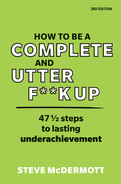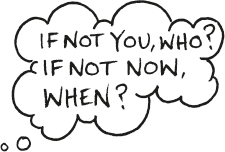Step
7
If you do have goals, don’t put them in writing, and if you do, don’t think too big
Ever heard of the study done with Harvard graduates? In the 1950s graduates were asked how many had goals. The answer was almost everyone (you’d have to be dead from the neck up not to have some goals, dreams and ambitions). More importantly, the students were then asked how many had put those goals in writing. The answer was only 3%. After following them around for the next 30 years (which must have been annoying if you were one of the graduates), it was found that 3% of the group were worth more financially than the other 97% combined! It was the same 3% who had written goals. Coincidence? The point is, as long as goals stay in your head, they will stay only dreams.
Another reason why students of the fuck up must be careful not to commit their goals to ink is that it makes you think. You see, you can’t have everything (there isn’t enough time to have everything; anyway where would you keep it all?) but you can have anything. Most people just won’t decide what their anything is going to be. Remember, success is a decision. All you have to decide is what you want to be, do and have. Rather than make some tough choices about how they would like to spend their time, failures put it off, hoping they can realise all the dreams swirling around inside their head. That’s until they wake up one day and realise time has run out.
Over 50 years of research, not just from Harvard but also from areas like Neuro Linguistic Programming,1 proves that having any written goal will get you into the top 3%. However, if you want to reach the top 1%, and this is confirmed by my own direct experience of working with hundreds of individuals, you also need to write your goals to meet some strict criteria. That’s why all of Phil’s goals are written as SMARTS:
Phil then checked he had the intense desire to achieve the goal, that he had a compelling, motivating reason for wanting it. He knew this would greatly enhance his chances of success.
That’s why he gave more thought to the why than he did to the how. He knew if he had a big enough why then he could, must, find the how. If you have got a really good reason, you can make yourself do almost anything. (If you have failed to achieve a goal in the past, it may be because you simply didn’t have enough reasons.)
“If you have got a really good reason, you can make yourself do almost anything.”
Phil then identified the obstacles he needed to overcome; identified the help he would need; planned his priorities; got a clear mental picture, or dominant thought pattern, of the goal already accomplished; and finally backed his plan with commitment, persistence and resolve. And he believed he could do it.
Oh, and one other crucial thing – having done all of the above, Phil took action.
Phil says sometimes a small, easily achievable goal can dramatically change things – say the quality of a relationship. This gave me food for thought. It occurred to me that I had something thatI shared with my oldest son, Tom (we are both passionate about our local rugby team, Leeds Rhinos, and go and watch them together even though he’s long since left home), but that there wasn’t anything that I and my other son, Finlay, did together – our ‘thing’ if you like. So, just by way of an experiment, you understand,I set a goal to find something. As soon as I did that, suddenly everywhere I looked, I kept seeing and reading about GamesWorkshop. I’d never noticed it before but seemingly it’s been around for years (there goes that RAS again). This is a hobby with masses of appeal to boys, and for that matter, men. You collect, build and paint model soldiers and then stage battles. So for a few years this became our thing and something we could share. It proved a brilliant way of strengthening our relationship. This all happened when Finlay was nine since which age, unlike several men I know, he’s moved on from Games Workshop. Now, at the time of writing, one of the things we share apart from a love of Northern Soul is going to the gym together once a week. This mainly consists of him shouting at me for 60 minutes while I sweat like a Dutch cheese because he says my form is all wrong. Of course, I wouldn’t suggest you should set yourself these sorts of small goals that can create big results in your relationships.
After discovering this stuff works, Phil now also feels there is even more magic in thinking big. He agrees with the advice of Les Brown and Mark Victor Hansen who said: “Shoot for the moon. Even if you miss it you will land among the stars” and “Think big, act big and set out to accomplish big results.” Donald Trump, or as someone once described him, “The man that’s sort of like a pumpkin having a nervous breakdown”, says: “If you are going to be thinking anyway, you might as well think big.” I hate to sayI have to agree with him on that. So remember, please don’t write down your goals and don’t think big. That’s assuming you give the quality of your life any thought at all.
1 NLP – not the most catchy name for what is a very powerful and rapid way to create positive change in your life. It’s not all beards and sandals. Honest. NLP is based on three simple principles for success. First – know what you want; have a clear idea of your outcome in any situation. Second – be alert and keep your senses open so that you can notice what you are getting. Third – have the flexibility to keep changing what you do until you get what you want.
2 See Disclaimers at the back of this guide.

